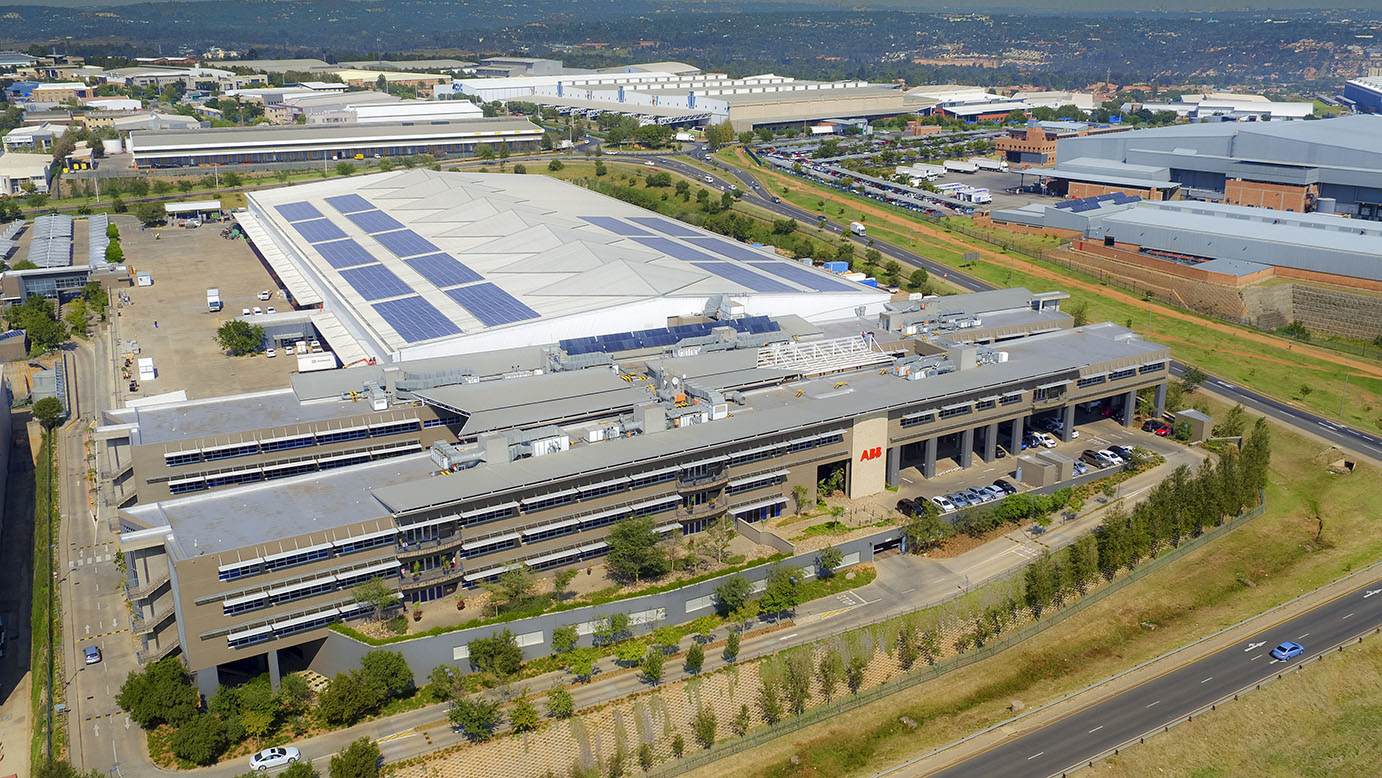ABB’s innovative microgrid: providing reliable, affordable and sustainable power
We Mean Business coalition
Introduction
 Following the installation of an innovative microgrid solution, global technology company ABB is saving over US$150,000 a year in fuel costs and cutting carbon emissions by around 1,000 tons a year. The breakthrough innovation, which combines solar photovoltaic (PV) and battery-based stabilization technology, enables the company’s Longmeadow facility in Johannesburg to operate as its own ‘power island’ in the event of planned or unplanned disturbances to the grid.
Following the installation of an innovative microgrid solution, global technology company ABB is saving over US$150,000 a year in fuel costs and cutting carbon emissions by around 1,000 tons a year. The breakthrough innovation, which combines solar photovoltaic (PV) and battery-based stabilization technology, enables the company’s Longmeadow facility in Johannesburg to operate as its own ‘power island’ in the event of planned or unplanned disturbances to the grid.
Project rationale
South Africa has the highest electricity consumption in the sub-Saharan region, with demand continuing to outpace supply. Businesses across the country face disruptions due to regular power shortages. Typically, companies use backup diesel generators to cope with these shortfalls. The result is an increase in consumption of expensive and polluting fossil fuels.
With the private sector responsible for around two fifths (41%) of South Africa’s power consumption, companies have a role to play in designing cost-effective and environmentally friendly energy solutions. Providing innovative power services to utility, industry, and transport & infrastructure customers is ABB’s core strength. So it makes sense for the company to lead by example, introducing pioneering solutions at its own facilities and then sharing that experience with its international customer base.
Project approach
ABB needs continuous, resilient power to ensure a reliable, 24/7 supply of electricity to its 96,000 square meter Longmeadow facility, which is home to around 1,000 employees. The most logical approach was to find a way of enhancing this important facility.
This is why ABB turned to a ‘microgrid’ solution, which ensures a continuous local power supply as well as a reduced reliance on fossil fuels. Another major advantage of microgrids is the opportunity they offer to defer large-scale grid investments in areas that have a weak connection to the main electricity grid.
Microgrids are generally attached to the main power grid, but they can disconnect and operate autonomously when required. As well as providing a secure power supply, these so-called ‘power islands’ also open up the possibility of integrating locally-generated renewable energy directly into a company’s power supply.
Project details
A central feature of the microgrid solution developed by ABB is the 750 kWp solar PV plant located on the Longmeadow facility’s rooftop. During normal operations, power from the PV system supplements electricity from the grid. The PV plant replaced two 800 kVa diesel-powered generators that were previously used for backup power.
ABB’s use of a cutting-edge battery design marks a second breakthrough feature. Drawing on the latest lithium-ion technology, the 1 MVA/ 380 kWh PowerStoreTM Battery helps stabilize the microgrid against fluctuations in frequency and voltage by rapidly absorbing or injecting power. This provides a smooth transition from grid to back-up power during outages. It also enables peak shaving during peak consumption times.
One of the solution’s main distinguishing features is the remote, cloud-based system that helps ABB monitor and maintain the microgrid. This Microgrid Plus Control System ensures that the power supply is well-balanced between fossil-fuel and renewable energy sources. It also guarantees that electrical power is of utility-grade at all times. This unique control system is made possible by the rapid processing of real-time data, coupled with the integration of automated technologies.
Project benefits
- Cut annual diesel fuel consumption by 27 percent
- Cut annual diesel generator use by 76 percent
- Cut energy costs by US$150,000 per year or 33 percent, to US$460,000
- Reduce overall carbon emissions by an estimated 1,000 tons per year
The microgrid is helping reduce consumption of both grid-provided electricity and diesel fuel. Its combination of innovative battery technology and a bespoke control system enables a seamless transition between grid-connected and islanded modes. As a consequence, should a power quality issue arise or an outage of the main grid occur, there is no disruption to loads. The system also ensures that the Longmeadow facility is now no longer fully dependent on expensive and dirty diesel fuel during blackouts or dips in power, which prior to the microgrid installation occurred every three days on average.
In total, the addition of solar-generated electricity has caused annual diesel consumption to decrease from around 52,000 liters to 38,000, a fall of 27 percent. Thanks to the microgrid solution, the facility’s generators now run for only 106 hours annually, down 76 percent compared to 433 hours beforehand. In cost terms, this translates into an overall drop in energy costs of US$150,000 per year, to US$460,000. This environmentally-friendly solution has also seen overall carbon emissions reduce by an estimated 1,000 tonnes per year.
Since switching over to the new microgrid in June 2016 we now have full confidence that it is always ‘business as normal’ for this site, no matter what is happening on the local grid.Leon Viljoen, ABB’s country management director for South Africa
The solution also enhances ABB’s reputation as a pioneer in microgrid technology. The company has installed around 40 microgrids globally. These encompass a diverse range of applications, from serving remote communities, islanded grids to supporting utility grids and industrial campuses.
ABB is part of the Low Carbon Technology Partnerships initiative, which is led by the World Business Council for Sustainable Development (WBCSD).

